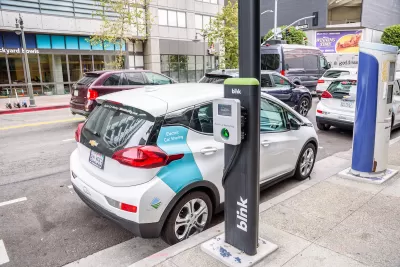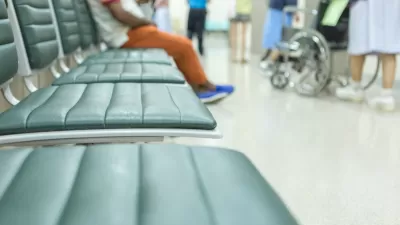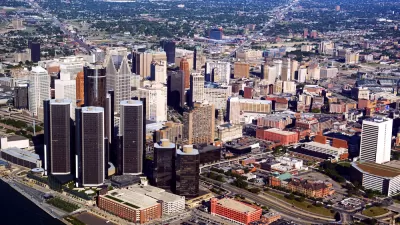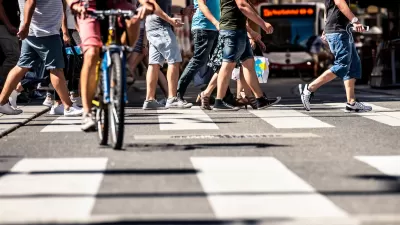Data from a Los Angeles car share program showed its impact on underserved communities was ‘limited by its small footprint.’

A new report assesses the potential of the BlueLA car share program to improve transportation equity in Los Angeles. As Gersh Kuntzman explains in Streetsblog USA, the report notes that low-income residents gain improved transportation access only when programs are heavily subsidized and have broad coverage areas.
“There's no question that car-share has shown potential in helping urban areas reduce automobile ownership and lower vehicle miles traveled, as well as increasing walking and public transit use. But other studies have shown that urban car-share members are disproportionately white, even when vehicles are located in neighborhoods with many disadvantaged residents.”
The BlueLA program aimed to provide service in underserved areas and offer low rates, but the study notes that “during the study period, BlueLA stations ‘only served a small portion of the city of Los Angeles,’ the report said, reducing transportation access for people who don't own cars, but would have liked to have used BlueLA.”
Kuntzman gives examples from other cities that are working to expand access to car share services. “The Philadelphia Housing Authority has just inked a deal — thanks to a federal Housing and Urban Development job program grant — that will bring two Zipcars to each of four housing projects,” and New York City is providing public housing residents with free Zipcar memberships. City officials hope car share can improve mobility and help residents avoid the burdens of car ownership.
FULL STORY: To Improve Equity, Car-Share Needs Subsidies, Large Coverage Area: Report

Alabama: Trump Terminates Settlements for Black Communities Harmed By Raw Sewage
Trump deemed the landmark civil rights agreement “illegal DEI and environmental justice policy.”

Study: Maui’s Plan to Convert Vacation Rentals to Long-Term Housing Could Cause Nearly $1 Billion Economic Loss
The plan would reduce visitor accommodation by 25% resulting in 1,900 jobs lost.

Why Should We Subsidize Public Transportation?
Many public transit agencies face financial stress due to rising costs, declining fare revenue, and declining subsidies. Transit advocates must provide a strong business case for increasing public transit funding.

Paris Bike Boom Leads to Steep Drop in Air Pollution
The French city’s air quality has improved dramatically in the past 20 years, coinciding with a growth in cycling.

Why Housing Costs More to Build in California Than in Texas
Hard costs like labor and materials combined with ‘soft’ costs such as permitting make building in the San Francisco Bay Area almost three times as costly as in Texas cities.

San Diego County Sees a Rise in Urban Coyotes
San Diego County experiences a rise in urban coyotes, as sightings become prevalent throughout its urban neighbourhoods and surrounding areas.
Urban Design for Planners 1: Software Tools
This six-course series explores essential urban design concepts using open source software and equips planners with the tools they need to participate fully in the urban design process.
Planning for Universal Design
Learn the tools for implementing Universal Design in planning regulations.
Smith Gee Studio
Alamo Area Metropolitan Planning Organization
City of Santa Clarita
Institute for Housing and Urban Development Studies (IHS)
City of Grandview
Harvard GSD Executive Education
Toledo-Lucas County Plan Commissions
Salt Lake City
NYU Wagner Graduate School of Public Service





























